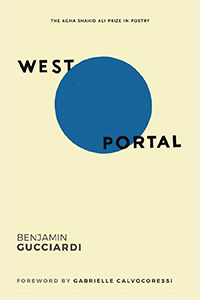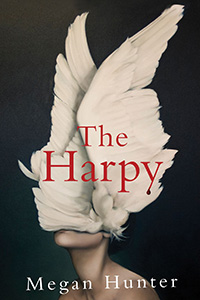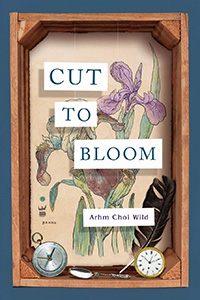 print preview
print previewback BLACKBIRD EDITORS
Recommendations & Reviews
This fall, the Blackbird Editors present reviews and recommendations of books that have been
particularly enticing lately, from Megan Hunter’s acclaimed second novel The Harpy, to Arhm
Choi Wild’s engaging debut poetry collection Cut to Bloom, to Benjamin Gucciardi’s striking
book of poetry West Portal, to Taylor Johnson’s multifaceted debut poetry collection Inheritance.
West Portal by Benjamin Gucciardi | Review by Danielle Kotrla
University of Utah Press, 2021
 |
In “Hunting Chanterelles in the Oakland Hills,” the speaker’s friend instructs, “Slow down . . . // they’re easy to miss.” Yes, perhaps here chanterelles are the immediate topic of conversation, but I believe this sharp eye toward the minute and easy-to-miss is one of the driving forces that makes Benjamin Gucciardi’s West Portal such a compelling and strong debut. And this is to say nothing of what’s at stake, as we learn early on in “King Tide” when the speaker reflects, says, “Back then, / I didn’t understand that details / made life worth living—” It’s clear from early on in the collection that regardless of the situation or place, it’s not so much about what we notice as it is about acknowledging the fact that it might just be the act of noticing and seeing that keeps us alive.
There’s no doubt that this collection is full of striking details—from the canyon where the speaker and their sister once gathered nasturtiums to the crayfish in the shallows pretending to be a stone. But the poems in West Portal go beyond mere cataloguing to reach toward something more active, a process akin to peeling away the outermost layer of the world to see its inner workings. This action shares its significance with what is described by the ghost of the speaker’s sister when she asks, “Do you remember those picture books / where the illustrator removes the outer wall // of a jumbo jet to show children where luggage goes.” This leaning down and peering in is what reveals just how intricate and complex the act of paying attention, and therefore, living, really is.
But in order to acknowledge these complexities, it seems important to note that the moments of joy and fulfillment throughout these poems often seem to also be the catalyst for fragmentation and fracture—when, for instance, the speaker in “The Rungs” watches a boy put his hand on another’s back and say, “maje, desahógarte, // which translates roughly to un-drown yourself.” The moment is vulnerable and kind, yet it’s also this observation that leads the speaker to the conclusion that “no English phrase so willingly accepts // that everyone has drowned.” And as mentioned earlier, though the chanterelles in “Hunting Chanterelles in the Oakland Hills” are in fact easy to miss, it’s the eventual act of finding the mushroom, of slipping the stem from loam, that causes the speaker to splinter. These moments of tender beauty throughout the collection seem critical to these observations on what it means to carry grief and hurt along with us wherever we go.
Ultimately, I think two of the questions that West Portal asks are, “What happens when we do know some of what remains? What happens when we hear the echoes and notice the minutiae?” Perhaps, it might all be closer to us than we originally thought, as “there is only one dam between us / and the coast,” after all. Gucciardi’s precise language and handling of the line offers one potential answer: we continue to pay attention, to risk fracture, in hopes that we might find “an entrance / to the cold, thrashing sea.” I admire how the poems in West Portal take on this task for themselves, but I also deeply appreciate how they invite me to do the same.
Benjamin Gucciardi is the author of West Portal (University of Utah Press, 2021), and the chapbooks Timeless Tips for Simple Sabotage (Quarterly West, 2021) and I Ask My Sister’s Ghost (New Michigan Press, 2020). He works with newcomer youth in Oakland, California through Soccer Without Borders, an organization he founded in 2006.
~
The Harpy by Megan Hunter | Review by James Fowler
Grove Press, 2020
 |
“I asked my mother what a harpy was; she told me that they punish men, for the things they do.”
—Megan Hunter
Megan Hunter’s second novel, The Harpy, explores the breakdown of a marriage and the transformation of a woman as she traverses a void of rage, resentment, and violence. The novel opens on the main character, Lucy, a wife and mother who has set aside her PhD to raise her two young sons. A telephone call tells her that her husband, Jake, has been having an affair with his co-worker. In the midst of marital breakdown, Lucy and Jake make a pact to maintain their marriage; she can hurt him three times without warning or limitations. By means of this journey of recriminations, Hunter explores the mythological creature, the harpy, with whom Lucy has always had a significant fixation, and, as Lucy’s punishments spiral out of control, weaves in a fairytale-like rebirth of a woman through the throes of anger, jealousy, and resentment.
Hunter offers sparse prose as melodious as it is concise and penned with a deft and careful hand. She presents Lucy as imperfectly human yet self-aware as she recognizes her craving for brutality and revenge, remaining ever cognizant of the consequences this violence will have on her family. Where Hunter particularly excels in the novel is in how she confronts the predictable clichés of infidelity and broken marriages and confronts them head on—“All of those stupid, broken, fictional couples on television, not even able to find their own original language. And here we were.” She doesn’t present this as a new topic, but rather builds on the idea and weaves in a discussion of mothers as human and painfully imperfect beings.
Particularly, in her creation of the harpy, she shatters the exhausted image of the perfect, unconditional mother by employing a unique quality of magical realism. And the harpy proceeds to consume the prose and the novel as a whole as it gnaws through its own apparently restricted and insidious development with each act of violence. In effect the harpy acts as a creature slowly creeping out from the shadows of Lucy’s identity. Constructed within the narrative voice is a third, unbodied presence carrying the reader through Lucy’s transformation—perhaps Lucy in a future context after this rebirth and provided with a space to ruminate and observe the violence that she craves to physically fill the ever-growing abyss of her crumbling marriage.
The Harpy hinges on terse fantastical elements as Hunter offers Lucy something more realistic than a separation, a divorce, or mending of bonds; Lucy achieves a physical, mental, and emotional rebirth. Yet in the novel’s abruptness the reader is left to their own perception of this rebirth, be it real or figurative. “But in the middle of the night I do see, and laugh: it is happening now as I always knew it would. I am her: I am here.”
In the final moments of the novel, Hunter asks us to consider what the harpy represents to Lucy—either a complete surrender to violence and brutality, or possibly, and significantly, a chance to break the cycle of abuse and shattered families, which Lucy herself experienced as a child. Hunter takes the reader seamlessly back and forth through time as the plot progresses and we are given quick snatches of Lucy’s life—her childhood, her struggles in motherhood, her relationship with Jake—but loses the reader at times in the point of view. The narration is always with Lucy, but which version of her isn’t always clear.
Hunter leaves us to search for our own conclusions when the novel ends, but this lack of definite resolution represents the reality in which Lucy exists—a person in the throes of rage and resentment might expect a significant change but not be not offered the space to fully clean the wounds. Similarly, we are left to consider Lucy as the protagonist, and to what end she herself is guilty in her actions or is validated through her surrender of identity as a mother and wife—by achieving a reclamation of agency. The Harpy is a fresh, nuanced, and quietly chaotic narrative on marriage, motherhood, revenge, betrayal, and the mundanity of a life juxtaposed against a twisted transformative fairytale. Hunter has crafted a reality more violent and more valid than the typical story of motherhood and a marriage in chaos.
Megan Hunter is the author of The Harpy (Grove Press, 2020), selected as one of Esquire’s Best Books of Fall 2020; and The End We Start From (Grove Press, 2017), winner of the Foreword Reviews Editor’s Choice Award.
~
Inheritance by Taylor Johnson | Review by Caitlin Wilson
Alice James Books, 2020
 |
Inheritance, Taylor Johnson’s debut collection, is composed of intricate poems that explore the complex nature of language, how it is a kind of inheritance that can create boundaries but also, through modes like music and poetry, create spaces of mutual intimacy. Language is positioned simultaneously as a tool for capitalism yet also a way of unburdening oneself. In the poem “Bolano Blue,” Johnson writes, “For a long time I wondered what English meant, if it was worth its weight in enlightenment,” and this question returns and evolves while we’re left to wonder if, as Johnson may suggest, enlightenment arrives in spite of language.
The physical world in Inheritance is treated with a tender sensitivity to the multitudes that exist in speech, places, people—even animals: “Consider the deer, who, when I say deer, doesn’t know / whether or not I mean a single one [. . .] Who, like me, resists / the gesture toward singularity.” Johnson is skillfully attuned to sound and place, the locations in their poems fluctuating between the cityscape of Washington, DC, and rural Virginia. A pleasant tension exists between the vital physicality of Johnson’s poems and their complex syntax, both of which defy the constraints of the page.
Johnson writes from Black, trans experience, and their poetic voice is multifaceted, often engaging with the subject of identity, or “the palimpsest: I.” With unfailing generosity, the self is presented as a place of openness and reception, rather than a delineated boundary from the world. The poems of Inheritance are epistemological, concerned with sources of knowledge and self-knowledge: “I move toward / through the self: discipline, abnegation, // erotics of the ascetic: my body opens into response, opens to building an idea.” While constructing these concepts of selfhood, Johnson references other Black poets and musicians, books, and philosophy. Within the erudition is sensuality: go-go music and Thoreau.
Inheritance communes with all aspects of the world, and where we arrive post-contemplation is not a world to feel hopeless in, despite first glance. In “Conjecture on the nature of inconvenience,” Johnson writes, “If there is a body dispossessed then there is a hole in the language” and whether the hole can truly be filled is unclear, as seen again in “I Set Out to Touch it All Over”: “I listened to mine, the body, the field / and still this hole.” Yet, on second glance, the hole transforms from a lack into an opportunity—a niche whose silence is asking to be heard, then filled. In “Trans is Against Nostalgia” the speaker builds a boat daily, a structure to buoy their soul against constant inundation: “I’ve picked up the hammer every day / and forgiven myself. There is a new / language I’m learning by speaking it.”
Taylor Johnson is the author of Inheritance (Alice James Books, 2020), which won the 2021 Norma Farber First Book Award from the Poetry Society of America. He is a recipient of the 2017 Larry Neal Writers’ Award from the DC Commission on the Arts and Humanities, and the 2021 Judith A. Markowitz Award for Emerging Writers from Lambda Literary.
~
Cut to Bloom by Arhm Choi Wild | Review by Rebecca Poynor
Write Bloody Publishing, 2020
 |
Arhm Choi Wild’s debut collection, Cut to Bloom, propels readers into a journey of trauma, survival, healing, and identity driven by poems filled with an emotional momentum that is sustained by tension and narrative arc. Through these powerfully narrative and sometimes subtly figurative poems, Wild’s words carry readers with striking images and a distinct musicality through life after trauma and the search for self-identity as a queer Asian-American person.
In the first section of this two-sectioned collection, Wild gives readers an often-haunting look at trauma. This first section is titled “한/han,” which is defined in a provided glossary as “the idea of a shared struggle and inheritance that is part of the Korean personality and cultural make-up.” This section is built of narrative pieces that give readers necessary context for the trauma that leads to the speaker’s healing. Coexisting with the speaker’s own childhood trauma is the generational trauma reflected in the section’s title. In “The Forgotten War,” Wild writes of this generational trauma in parallel with the speaker’s identity, both cultural and otherwise, in sections of varying forms. In the sixth and final section of the poem, Wild writes, “like a foreigner / craving to fit / into the language / of home and memory, split / from the homeland / we wouldn’t / have survived, / queer and single-mothered.” Here, Wild gathers the rising themes of the collection together.
The second section of the book shows readers the experience of post-traumatic healing and the continued search for identity. As the speaker navigates the process of healing, the tone of the poems shift, inciting an almost-hope in the reader. The poem “Fall for Her” begins, “Fuck it. Fill your hands / with her though you tremble, / the daisy outside your door / stuck between bending / beneath the wind / and rising from the ground.” Powerful language of the body appears in different modes throughout these poems, often transforming the body into objects of nature, as it does here.
The title poem, “Cut to Bloom,” particularly blends the speaker with natural image, ending with: “no matter how rough the cut / there is a chance / for a bloom.” Throughout the collection, Wild creates a voice the reader becomes invested in, and there is lightness felt in seeing the speaker overcome the chronicled experiences. Wild’s voice leaves readers with a building hope for this blooming speaker, their found identity, and home.
Arhm Choi Wild is the author of Cut to Bloom (Write Bloody Publishing, 2020), which won the 2019 Write Bloody Book Contest. They have received fellowships from Kundiman, the Sewanee Writers’ Conference, and the Martha’s Vineyard Institute of Creative Writing. They work as the Director of the Progressive Teaching Institute and Diversity Coordinator in New York City. ![]()
Contributors’ notes: Editorial Staff